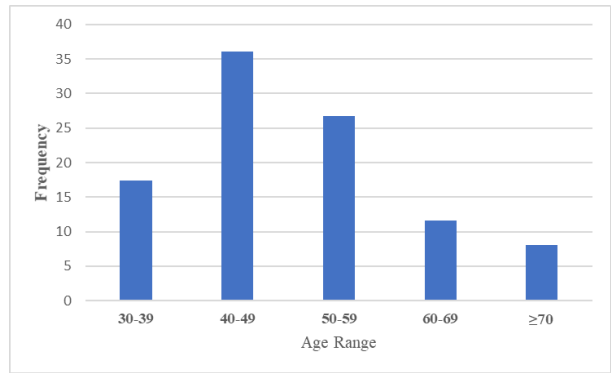Characteristics of Breast Cancer Patients Who Refused Conventional Treatment in a Teaching Hospital in Southwestern Nigeria
Main Article Content
Abstract
Background
Patients’ adherence to treatment recommendations is in the form of a spectrum: complete adherence or total rejection of the offered standard treatments. The aim of this study was to describe the characteristics of breast cancer patients who refused standard treatments in order to engender a focused intervention.
Methods
This was a retrospective study of breast cancer patients from 2017-2022. Data generated were analyzed using SPSS version 23.0. The results were presented using descriptive statistics. Inferential statistics for subgroup analysis was by chi-square test or risk difference with confidence intervals
Results
Among 343 patients, 86 (25% (95% CI 21-30) did not initiate conventional oncologic treatment. All were females and their age range was 33–83 years (mean, 49.9±12.0 years). The majority of the women were married (73%), educated (79%), low-income earners (69%), rural dwellers (63%) with advanced disease (81%). None of the patients had government insurance. The mean duration of symptoms was 11.9±9.7 months. Among 71patients with vital information, 50 (70% (95%CI 58-71) were confirmed dead in the last 3 years. The probability of death within 3 years was 38% (95%CI 8.0-68%) and was higher among those diagnosed as late-stage disease.
Conclusions
A large number of patients still fail to accept conventional treatments after breast cancer diagnosis. Understanding the patients’ characteristics may be necessary to recognize situations where active education and support can help patients accept standard treatment thereby prolonging survival.
Downloads
Article Details

This work is licensed under a Creative Commons Attribution 4.0 International License.
This work is licensed under a Creative Commons Attribution 4.0 International (CC BY 4.0) license. To view a copy of this license, visit https://creativecommons.org/licenses/by/4.0/.
How to Cite
References
Forouzanfar MH, Foreman KJ, Delossantos AM, Lozano R, Lopez AD, Murray CJ, et al. Breast and cervical cancer in 187 countries between 1980 and 2010: a systematic analysis. Lancet 2011;378:1461-84. DOI: https://doi.org/10.1016/S0140-6736(11)61351-2
Olaogun, JG. Omotayo JA, Ige JT, Omonisi AE, Akute OO, Aduayi OS. Socio-demographic, pattern of presentation and management outcome of breast cancer in a semi-urban tertiary health institution. Pan African Medical Journal. 2020;36(363). DOI: https://doi.org/10.11604/pamj.2020.36.363.17866
Agodirin O, Olatoke S, Rahman G, Olaogun J, Olasehinde O, Katung A. et al. Presentation intervals and the impact of delay on breast cancer progression in a black African population. BMC Public Health. 2020;20(1):962. DOI: https://doi.org/10.1186/s12889-020-09074-w
Verhoef MJ, Rose MS, White M, Balneaves LG. Declining conventional cancer treatment and using complementary and alternative medicine: a problem or a challenge?. Curr Oncol. 2008;15 Suppl 2(Suppl 2):s101-6. DOI: https://doi.org/10.3747/co.v15i0.281
Verkooijen HM, Fioretta GM, Rapiti E, Bonnefoi H, Vlastos G, Kurtz J, et al: Patients’ refusal of surgery strongly impairs breast cancer survival. Ann Surg 2005; 242:276–80. DOI: https://doi.org/10.1097/01.sla.0000171305.31703.84
Joseph K, Vrouwe S, Kamruzzaman A, Balbaid A, Fenton D, Berendt R, et al. Outcome analysis of breast cancer patients who declined evidence-based treatment. World J Surg Oncol. 2012; 26;10:118. DOI: https://doi.org/10.1186/1477-7819-10-118
Chen SJ, Kung PT, Huang KH, Wang YH, Tsai WC. Characteristics of the Delayed or Refusal Therapy in Breast Cancer Patients: A Longitudinal Population-Based Study in Taiwan. PLoS One. 2015;10(6):e0131305. DOI: https://doi.org/10.1371/journal.pone.0131305
Adesunkanmi ARK,Lawal OO, Adelusola KA, Durosimi MA. The severity, outcome and challenges of breast cancer in Nigeria. Breast 2006;15(3): 399-409. DOI: https://doi.org/10.1016/j.breast.2005.06.008
Agodirin O, Aremu I, Rahman G, Olatoke S, Akande H, Olasehinde O, et al. Breast Cancer Treatment and Outcomes in Nigeria: A Systematic Review and Meta-analysis. Asian Pac J Cancer Care 2023; 8(3): 591-8. DOI: https://doi.org/10.31557/apjcc.2023.8.3.591-598
Huchcroft SA, Snodgrass T. Cancer patients who refuse treatment. Cancer Causes Control 1993;4:179–85. DOI: https://doi.org/10.1007/BF00051311
Adisa AO, Lawal OO, Adesunkanmi ARK. Evaluation of patients’ adherence to chemotherapy for breast cancer. Afr J Health Sci. 2008;15:22-7. DOI: https://doi.org/10.4314/ajhs.v15i1.30869
Clegg-Lamptey J, Dakubo J, Attobra YN. Why do breast cancer patients report late or abscond during treatment in ghana? A pilot study. Ghana Med J. 2009;43(3):127-31. DOI: https://doi.org/10.4314/gmj.v43i3.55338
McGee SA, Durham DD, Tse CK, Millikan RC. Determinants of breast cancer treatment delay differ for African American and White women. Cancer epidemiology, biomarkers & prevention: a publication of the American Association for Cancer Research, cosponsored by the American Society of Preventive Oncology. 2013; 22(7):1227–38. DOI: https://doi.org/10.1158/1055-9965.EPI-12-1432
Radley A, Payne S. A sociological commentary on the refusal of treatment by patients with cancer. Mortality. 2009; 14(4):309–24. DOI: https://doi.org/10.1080/13576270903257422
Bickell NA, Wang JJ, Oluwole S, Schrag D, Godfrey H, Hiotis K, et al. Missed opportunities: racial disparities in adjuvant breast cancer treatment. J Clin Oncol. 2006; 24(9):1357–62. DOI: https://doi.org/10.1200/JCO.2005.04.5799
van Kleffens T, van Leeuwen E. Physicians' evaluations of patients' decisions to refuse oncological treatment. J Med Ethics. 2005;31(3):131-6. DOI: https://doi.org/10.1136/jme.2004.008755
Suh WN, Kong KA, Han Y, Kim SJ, Lee SH, Ryu YJ, et al. Risk factors associated with treatment refusal in lung cancer. Thorac Cancer. 2017;8(5):443-50. DOI: https://doi.org/10.1111/1759-7714.12461
Siegel R, DeSantis C, Virgo K, Stein K, Mariotto A, Smith T, et al. Cancer treatment and survivorship statistics, 2012. Ca-a Cancer Journal for Clinicians. 2012; 62(4):220–41. DOI: https://doi.org/10.3322/caac.21149
Gaitanidis A, Alevizakos M, Tsalikidis C, Tsaroucha A, Simopoulos C, Pitiakoudis M. Refusal of Cancer-Directed Surgery by Breast Cancer Patients: Risk Factors and Survival Outcomes. Clin Breast Cancer 2018;18:e469-76. DOI: https://doi.org/10.1016/j.clbc.2017.07.010
Massa ST, Osazuwa-Peters N, Franco J, Ward GW, Walker RJ. Survival after refusal of surgical treatment for locally advanced laryngeal cancer. Oral Oncol 2017;71:34-40. DOI: https://doi.org/10.1016/j.oraloncology.2017.05.019
Olaogun JG, Agodirin OS, Etonyeaku AC, Omonisi AE, Joseph O. Management of Locally Advanced Breast Cancer: Challenges and Treatment Outcomes in an Emerging Tertiary Hospital in South-western Nigeria. Journal of Clinical and Diagnostic Research 2021;15(2): PC01-05. DOI: https://doi.org/10.7860/JCDR/2021/46159.14484





